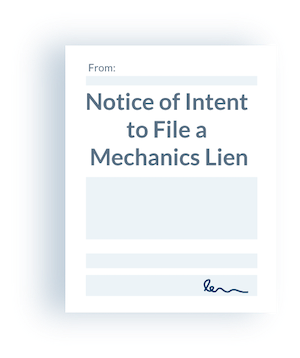
Colorado is home to Denver, which is one of the country’s fastest growing large cities. There are also several other metro areas in Colorado that are bursting at the seams such as Boulder, Colorado Springs, and even some smaller towns. Love it or hate it, all of that growth means that Colorado’s construction industry is also experiencing tremendous growth, and it shows no signs of slowing down anytime soon. Now is the best time to learn more about Notices of Intent to Lien in Colorado.
When it comes to getting paid on a Colorado construction project, there are several things that people in the industry must know. This includes certain rules and requirements that you must follow, and certain documents that you must use.
One of those “important-in-Colorado” documents is the Notice of Intent to Lien, a document that’s required in Colorado. Please read on for an overview of this notice and why it matters in the state of Colorado.
Notice of Intent to Lien in Colorado
The Notice of Intent to Lien is the construction industry’s equivalent of a demand letter or dunning letter, with one notable exception. Unlike a typical demand letter, Notices of Intent to Lien actually work!
NOIs are so effective at prompting payment because the fear of a mechanics lien on a project is great. After all, a successful mechanics lien claim could mean that the property owner ends up losing their property to satisfy the debt.
Because of this, the upper-tiered parties on a project (typically, the owner of the property and the general contractor) will do just about anything in their power to prevent a lien from being filed. The Notice of Intent gives the paying parties one last chance to solve the payment issue before the claimant files a mechanics lien.
Therefore, a Notice of Intent is a great way to get everyone’s attention and prompt a payment.
What’s the Difference Between a Notice of Intent to Lien and a Preliminary Notice?
Although they may seem similar on the surface, the difference between a Preliminary Notice and a Notice of Intent to Lien lies in the function they serve.
Preliminary Notices let everyone know that you’re on the job along with securing your lien rights. Preliminary Notices let the desired parties know who you are, what kind of work you’re doing, and/or what kinds of materials you’re furnishing for the project.
Notices of Intent are warnings to the upper-tier that you will file a lien in the event of nonpayment.
Both notices directly affect your lien rights. You may send both to the property owner, prime contractor, or GC via personal service, registered mail, or certified mail, return receipt requested. Just make sure you retain sufficient proof that you delivered the notices.
It’s also worth noting that Preliminary Notices are not mandatory under Colorado law. However, it’s a good idea to send one for a multitude of different reasons.
Notices of Intent Are Mandatory in Colorado
Although Preliminary Notices aren’t necessary, Notices of Intent certainly are. Before you can file a mechanics lien in Colorado, the future claimant (you) must send a Notice of Intent. This requirement is strictly enforced. See: C.R.S. § 38-22-109.
This puts Colorado in the minority of states that require a NOI before a mechanics lien can be filed.
However, the NOI document is so effective at prompting payment, that here at Levelset, we recommend that construction companies send a Notice of Intent on every project where they’re experiencing payment issues.
The time period to send a Colorado Notice of Intent is 10 days before you file the mechanics lien with the county clerk and recorder’s office. Sending the notice does not extend or change the deadline to file a mechanics lien in any way.
This means the practical deadline to file a mechanics lien is really 10 days earlier than what the law says. So, waiting until the last minute to file a mechanics lien can be disastrous. The real deadline is even earlier than the deadline that’s spelled out in the law.
What Should My Notice of Intent Include?
Colorado doesn’t outline any specific requirements for what your Notice of Intent should include. However, it’s a good idea to simply include the information you’d use to prepare a mechanics lien form following Colorado mechanics lien law. The following information should suffice:
- The name of the owner
- The name and address of the lien claimant (you)
- The legal property description
- A lien statement that indicates the amount due to the potential lien claimant (you)
Now you know that a Notice of Intent to Lien is mandatory prior to filing a mechanics lien in Colorado. Fill out your Notice of Intent for free with Levelset’s easy to use document widget




